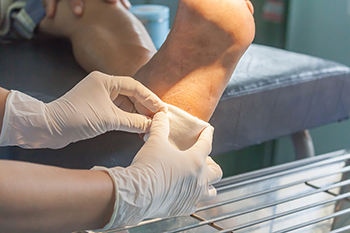Bremerton | Port Orchard (360) 377-2233

Charcot foot, also known as Charcot neuroarthropathy, is a condition characterized by progressive weakening and degeneration of the bones and joints in the foot or ankle. It often affects individuals with peripheral neuropathy, such as those with diabetes. One significant complication of Charcot foot is the development of foot ulcers, which can result from pressure points and trauma due to the structural changes in the foot. These ulcers are particularly problematic as they can lead to serious infections and even amputation if left untreated. Unfortunately, Charcot foot and its associated ulcers may go undiagnosed or misdiagnosed initially due to symptoms resembling other foot conditions or neuropathic pain masking typical signs of inflammation. Podiatrists provide comprehensive care for Charcot foot including diagnosis, wound care, orthotic interventions, and patient education to prevent complications and improve the quality of life for affected individuals. If you feel a weakening in your feet or ankles, it is strongly suggested that you schedule an appointment with a podiatrist for a proper diagnosis and treatment. If you have Charcot foot, early intervention can thwart severe problems.
Wound care is an important part in dealing with diabetes. If you have diabetes and a foot wound or would like more information about wound care for diabetics, consult with one of our doctors from Kitsap Foot & Ankle Clinic. Our doctors will assess your condition and provide you with quality foot and ankle treatment.
What Is Wound Care?
Wound care is the practice of taking proper care of a wound. This can range from the smallest to the largest of wounds. While everyone can benefit from proper wound care, it is much more important for diabetics. Diabetics often suffer from poor blood circulation which causes wounds to heal much slower than they would in a non-diabetic.
What Is the Importance of Wound Care?
While it may not seem apparent with small ulcers on the foot, for diabetics, any size ulcer can become infected. Diabetics often also suffer from neuropathy, or nerve loss. This means they might not even feel when they have an ulcer on their foot. If the wound becomes severely infected, amputation may be necessary. Therefore, it is of the upmost importance to properly care for any and all foot wounds.
How to Care for Wounds
The best way to care for foot wounds is to prevent them. For diabetics, this means daily inspections of the feet for any signs of abnormalities or ulcers. It is also recommended to see a podiatrist several times a year for a foot inspection. If you do have an ulcer, run the wound under water to clear dirt from the wound; then apply antibiotic ointment to the wound and cover with a bandage. Bandages should be changed daily and keeping pressure off the wound is smart. It is advised to see a podiatrist, who can keep an eye on it.
If you have any questions, please feel free to contact one of our offices located in Bremerton and Port Orchard, WA . We offer the newest diagnostic and treatment technologies for all your foot care needs.